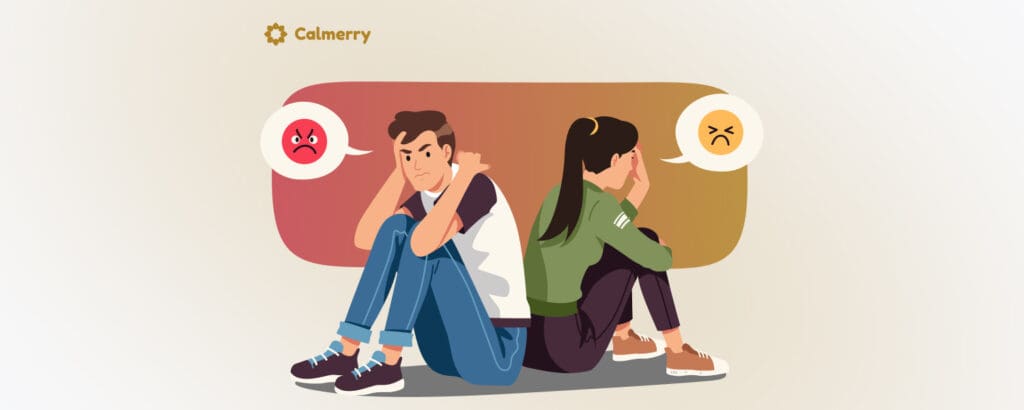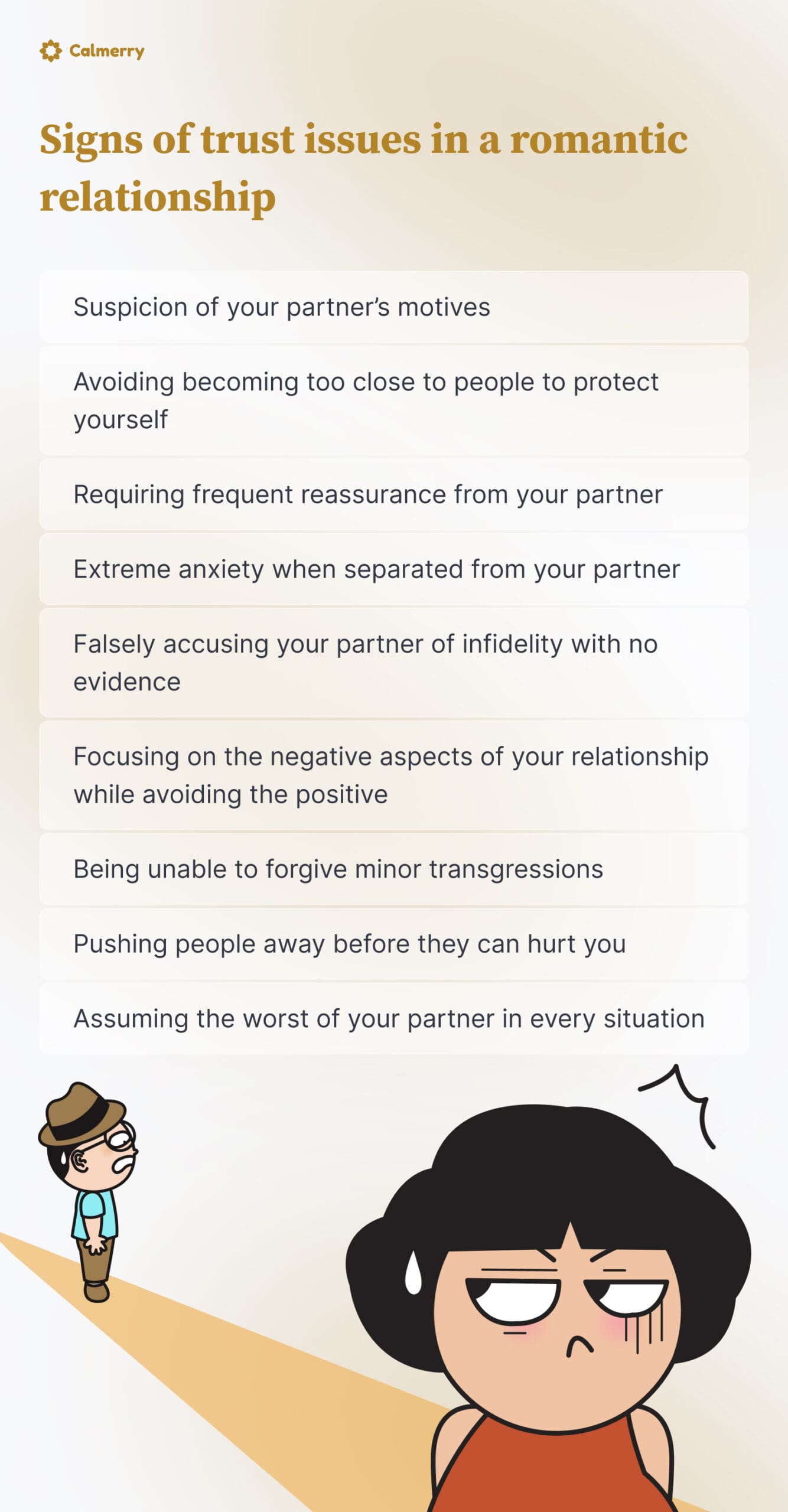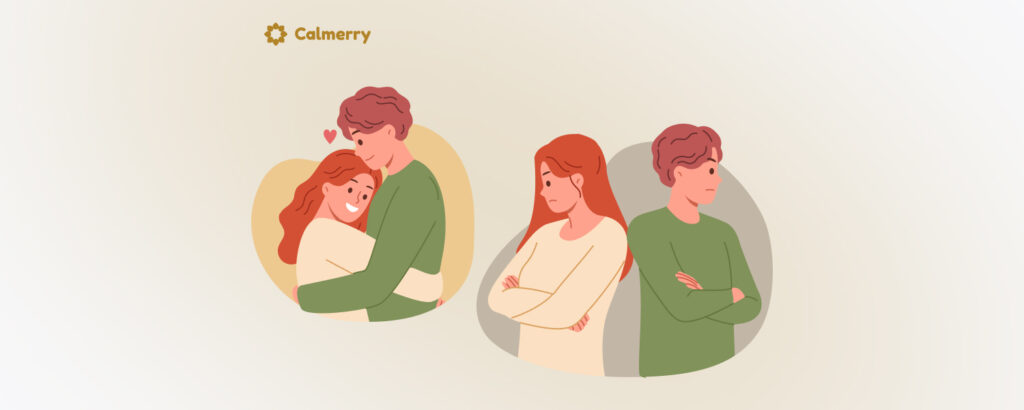Trust Issues in a Romantic Relationship: Signs, Causes, and Healing

In this article
Trust is essential for healthy, fulfilling romantic relationships, but some of us may struggle with trust. [1] Yılmaz, C. D., Lajunen, T., & Sullman, M. J. M. (2023). Trust in relationships: a preliminary investigation of the influence of parental divorce, breakup experiences, adult attachment style, and close relationship beliefs on dyadic trust. Frontiers in Psychology, 14. https://doi.org/10.3389/fpsyg.2023.1260480 In relationships, trust issues arise when partners have a difficult time trusting each other.
People with trust issues may worry that their romantic partners will cheat or abandon them. Or, they may fear opening up and becoming close to their partners.
The bottom line is that trust issues can interfere with relationships, but they can also be corrected.
Below, we’ll cover the causes of trust issues, so you can get to the bottom of the problem if you’re struggling with trust in your relationships. We’ll also talk about solutions for overcoming trust issues in relationships.
Signs of trust issues in a romantic relationship
If you’re not sure whether there are trust issues in your relationship, there are some key signs to look for. These include:
- Suspicion of your partner’s motives
- Avoiding becoming too close to people to protect yourself
- Requiring frequent reassurance from your partner
- Extreme anxiety when separated from your partner
- Falsely accusing your partner of infidelity with no evidence
- Focusing on the negative aspects of your relationship while avoiding the positive
- Being unable to forgive minor transgressions
- Pushing people away before they can hurt you
- Assuming the worst of your partner in every situation
These signs suggest you’re having a difficult time trusting your partner to remain faithful and meet your needs within the relationship.

Effects of trust issues on your relationships
When you struggle with trust issues, you might believe the steps you’re taking to protect yourself are keeping you safe. In reality, the behaviors associated with trust issues tend to take a negative toll on relationships.
In the end, this actually results in more emotional pain for you. Below, explore some of the negative effects of trust issues on relationships.
Reduced emotional intimacy
Healthy romantic relationships involve some degree of emotional intimacy. This means developing a close bond with your significant other and being vulnerable with them.
When you have trust issues, emotional intimacy is negatively affected. Rather than developing a close bond with your significant other, you are likely to remain at a distance to protect yourself from being hurt.
– Dr. Jenni Jacobsen, PhD, Licensed Social Worker (LSW), mental health writer
Ultimately, this just leads to the breakdown of the relationship because it’s difficult for two people to stay together when they aren’t emotionally close.
Increased conflict
All relationships involve disagreements from time to time, but in relationships with trust issues, conflict can become overwhelming. Research shows that lack of trust is associated with relationship problems, including conflict. [2] Arikewuyo, A. O., Eluwole, K. K., & Özad, B. (2020). Influence of lack of trust on romantic relationship problems: The mediating role of partner cell phone snooping. Psychological Reports, 124(1), 348–365. https://doi.org/10.1177/0033294119899902
More specifically, a lack of trust can lead to behaviors like snooping, which in turn increases conflict. When people don’t trust their partners, they may snoop into their partner’s personal life, checking emails or cell phone messages.
This leads to an invasion of privacy, which can be a source of ongoing conflict between partners.
Poor relationship satisfaction
It’s difficult for relationships to thrive when one partner doesn’t trust the other. Studies into the effects of trust on relationship satisfaction have proven this point.
Research has found that when there is less trust between partners, relationship satisfaction declines. [3] Fitzpatrick, J., & Lafontaine, M. (2017). Attachment, trust, and satisfaction in relationships: Investigating actor, partner, and mediating effects. Personal Relationships, 24(3), 640–662. https://doi.org/10.1111/pere.12203 Lack of trust is also linked to relationship problems, including emotional instability and the intention to break up. [2] Arikewuyo, A. O., Eluwole, K. K., & Özad, B. (2020). Influence of lack of trust on romantic relationship problems: The mediating role of partner cell phone snooping. Psychological Reports, 124(1), 348–365. https://doi.org/10.1177/0033294119899902
The bottom line is that trust issues interfere with healthy, fulfilling relationships. They may even cause two people to break up because there are too many problems to justify continuing the relationship.
Mental health problems
For some people, worries about a partner’s trustworthiness can become obsessive. Obsessive levels of distrust can have a negative effect on a person’s mental health.
In fact, obsessing over a partner’s trustworthiness is linked to an increased risk of depression and anxiety. [4] Brandes, O., Stern, A., & Doron, G. (2020). “I just can’t trust my partner”: Evaluating associations between untrustworthiness obsessions, relationship obsessions and couples violence. Journal of Obsessive-compulsive and Related Disorders, 24, 100500. https://doi.org/10.1016/j.jocrd.2019.100500 Instead of protecting yourself from emotional harm, you’re actually increasing your risk of mental and emotional health problems by remaining distrustful.
– Dr. Jenni Jacobsen, PhD, Licensed Social Worker (LSW), mental health writer
Increased risk of violence
Not everyone who struggles with trust issues will become violent toward their partners. In fact, this may be a more extreme effect of trust issues in relationships.
Nonetheless, it is worth mentioning that, in some instances, distrust can lead to relationship violence. [4] Brandes, O., Stern, A., & Doron, G. (2020). “I just can’t trust my partner”: Evaluating associations between untrustworthiness obsessions, relationship obsessions and couples violence. Journal of Obsessive-compulsive and Related Disorders, 24, 100500. https://doi.org/10.1016/j.jocrd.2019.100500 This is more likely to occur when distrust reaches obsessive levels.
A person who obsesses over a partner betraying them may use violence to try to control the partner. If you’re experiencing domestic violence in your relationship, it’s important to seek safety and support.
Reach out to the National Domestic Violence Hotline for assistance.
Causes of trust issues in relationships
It’s pretty evident that trust issues don’t bring any benefit to relationships, even if you think you’re protecting yourself by remaining skeptical of your partner’s intentions.
Given that trust issues can be the downfall of a romantic relationship, it’s helpful to get to the root cause of these issues. Once you understand the cause of your distrust, you can begin to overcome your fear of trusting your partner.
Explore the common causes of trust issues below, to arrive at a closer understanding of what’s causing them to crop up in your relationships.
Past infidelity or betrayal
If a former partner has been unfaithful or betrayed you, you know how painful it can be to experience this sort of thing.
When you’ve experienced past infidelity or betrayal, it’s understandable that you’d want to avoid feeling this type of pain again in the future. So, you may develop trust issues to protect yourself.
This can look like constantly questioning your partner’s whereabouts or intentions, because you’re so afraid of being betrayed again.
Overthinking after being cheated on can thus lead to distrust of new partners.
Childhood experiences
Whether you’re aware of it or not, early childhood experiences can have a lasting effect on you. If you had negative experiences with other people during childhood, you can have trouble trusting others once you reach adulthood.
Research has found that traumatic childhood experiences, such as sexual abuse, physical abuse, and neglect, are linked to a type of insecure attachment style during adulthood. [5] Mutum, L., & Bhambri, S. (2024, May 1). Effects of childhood trauma on emotional attachment and romantic relationships in Adults: a Correlational study. https://www.psychopediajournals.com/index.php/ijiap/article/view/351 This means that if you were mistreated by caretakers as a child, you may be hesitant to form close bonds with romantic partners as an adult.
This attachment anxiety makes sense: if you couldn’t rely on caretakers to keep you safe, why should you rely on a significant other to care for you without betrayal?
– Dr. Jenni Jacobsen, PhD, Licensed Social Worker (LSW), mental health writer
Personal insecurities
Sometimes, trust issues arise from personal insecurities, such as feeling inadequate. If you feel that you aren’t worthy of your partner’s love, you may distrust their motives, expecting them to eventually betray you.
Feelings of inadequacy can arise from insecurity about your physical appearance, your competence, or your worth as a human being.
Mental health problems
While trust issues can lead to mental health problems, sometimes the opposite is true. In other words, mental health problems can cause trust issues.
For example, post-traumatic stress disorder can lead to negative views about other people. This could include the belief that others cannot be trusted.
Alternatively, if you struggle with depression, you may feel worthless or hopeless, leading you to believe that no one would ever want to be in a relationship with you. This can also lead to trust issues, as you may expect people to betray you.
How to deal with trust issues in a romantic relationship
Trust issues can destroy the health of a romantic relationship, but there are ways to overcome them. If you’re struggling with trust in your relationships, try some or all of the strategies below to cope.
1. Heal from past infidelities
If a past infidelity is leading to distrust, it’s important that you recover from it. This means that jumping into a new relationship may not be the best choice. Instead, you should take time to grieve.
If you’ve already entered a new relationship, it’s still important to take time to heal from the past infidelity. It can be helpful to communicate openly with your new partner about what you’ve experienced so they understand where your distrust originates.
As you’re healing, try to think about the infidelity in rational terms. Remind yourself that your former partner’s betrayal wasn’t your fault. It’s also important to recognize that not everyone is unfaithful, and your new partner isn’t to blame for your former partner’s mistakes.
Maybe you’re just beginning to recognize that you haven’t healed from a past infidelity, and it’s bleeding into your current relationship. If this is the case, awareness is the first step toward healing.
– Dr. Jenni Jacobsen, PhD, Licensed Social Worker (LSW), mental health writer
2. Practice self-care
When you’re having a hard time with trust, you may be struggling with your own insecurities. If this is the case, it can be helpful to practice self-care.
Take time for rest and relaxation, and spend time engaged in hobbies and activities that you enjoy. It’s also important to care for yourself through proper nutrition and regular exercise.
When you take good care of yourself, your sense of self-worth will begin to increase. This can reduce personal insecurities that interfere with trust in your relationships.
3. Look for evidence of trustworthiness
Distrusting a significant other typically means being stuck in a cycle of expecting the worst and looking for evidence of betrayal. As the old saying goes, if you look for something, you’ll probably find it.
So, if you expect your partner to betray you, you’re probably constantly on the lookout for signs of betrayal. When you look for these signs, you may find them, even if they don’t actually mean your partner is untrustworthy.
Rather than fixating on subtle signs of betrayal, look for evidence that your partner is trustworthy. Do they show up on time for dates? Can you count on them to offer emotional support when you need it?
– Dr. Jenni Jacobsen, PhD, Licensed Social Worker (LSW), mental health writer
Chances are that you can find signs that your partner can be trusted. Look for these signs and appreciate them to give yourself a more balanced perspective.
4. Use calming activities
Trust issues can be quite anxiety-provoking, and you may find yourself ruminating and expecting the worst. For instance, if your partner comes home later than usual or uses a different tone when speaking to you, you might convince yourself they’re angry or about to leave you.
Such feelings can create feelings of panic and paranoia, so it can be helpful to use calming activities to ground yourself. When you’re feeling overwhelmed by feelings of distrust, take a moment to engage in deep breathing or meditation.
You can also regularly incorporate calming activities like yoga or meditation into your routine to help you become more mindful and less affected by intrusive thoughts related to distrust.
5. Seek help from a therapist
For some people, trust issues are an indicator of an underlying mental health problem that requires treatment. For instance, if you struggle with depression or anxiety, you may have trust issues arising from poor mental health.
Alternatively, if you have unhealed trauma or you’ve not recovered from a previous betrayal, you may benefit from the help of a therapist, who can assist you with processing and overcoming trust issues.
Couples counseling
Some couples may benefit from working with a couple’s counselor, who can help them work through relationship issues together. Couples counseling sessions can be an excellent setting for learning healthy communication and conflict management skills.
Couples counseling can also be useful for helping couples understand each other’s history and the root of trust issues.
Individual counseling
Alternatively, some people may benefit from individual relationship therapy. In this type of therapy, a mental health professional will work with you one-on-one to help you uncover the root of trust issues.
An individual therapist can help you develop healthy coping skills and uncover personal barriers interfering with trust in your romantic relationships.
If you’re exploring individual therapy for trust issues, consider working with an online therapist on Calmerry. We can connect you to one of our professionals from the comfort and privacy of your home, within 1 hour.
Yılmaz, C. D., Lajunen, T., & Sullman, M. J. M. (2023). Trust in relationships: a preliminary investigation of the influence of parental divorce, breakup experiences, adult attachment style, and close relationship beliefs on dyadic trust. Frontiers in Psychology, 14. https://doi.org/10.3389/fpsyg.2023.1260480
Arikewuyo, A. O., Eluwole, K. K., & Özad, B. (2020). Influence of lack of trust on romantic relationship problems: The mediating role of partner cell phone snooping. Psychological Reports, 124(1), 348–365. https://doi.org/10.1177/0033294119899902
Fitzpatrick, J., & Lafontaine, M. (2017). Attachment, trust, and satisfaction in relationships: Investigating actor, partner, and mediating effects. Personal Relationships, 24(3), 640–662. https://doi.org/10.1111/pere.12203
Brandes, O., Stern, A., & Doron, G. (2020). “I just can’t trust my partner”: Evaluating associations between untrustworthiness obsessions, relationship obsessions and couples violence. Journal of Obsessive-compulsive and Related Disorders, 24, 100500. https://doi.org/10.1016/j.jocrd.2019.100500
Mutum, L., & Bhambri, S. (2024, May 1). Effects of childhood trauma on emotional attachment and romantic relationships in Adults: a Correlational study. https://www.psychopediajournals.com/index.php/ijiap/article/view/351
online therapy
live video session



